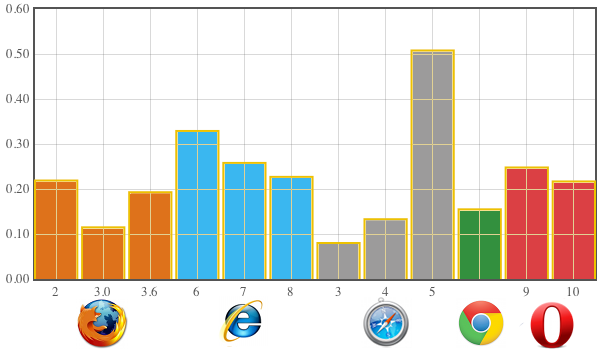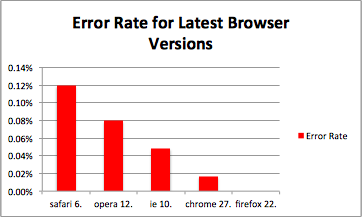Browsers and the frequency of their fall
Using its own tool for conducting automated testing of web applications in various Selenium environments, Sauce Labs receives large amounts of statistical data on a variety of errors. Often, errors occur not because of bad code, not a bad connection, and not because of charged microparticles from open space, but because of a browser crash. Of course, in this case, the browser will be restarted, but we are interested in the company-led statistics of crashes, which can be used to judge the reliability of certain browsers.

Two years ago, in August 2011, Sauce Labs had already published similar, albeit less detailed, statistics based on the millions of tests that the company's customers conducted. The results were somewhat predictable, but there were a few surprising moments.
')
Of course, Internet Explorer 6 was among the worst browsers, and even its newer versions did not shine with reliability. Firefox turned out to be “non-falling” in 2011, although Google Chrome was no worse, with its constant updates, leaving no user with an unstable version. According to the test results, Opera has also performed well.
Shock came Safari performance. The third, the oldest of the versions, showed high reliability. Not so bad was the fourth version. The fifth, the newest version at that time, “fell” almost twice as often as the “old one” of IE 6. Perhaps this was due to the fact that the tests in Safari were conducted under Windows, but this does not explain the normal behavior of the third and the fourth version in such an environment.

New data were compiled on the basis of 55 million tests. It may seem that the results are not surprising and are expected: without distribution by version, Internet Explorer drops at a quarter-percent frequency.

The graph shows the most frequently “falling” browsers from more than 150 different working environments on which tests are performed. IE 6 and 7 are unstable in the 0.31% and 0.29% tests, respectively. They are followed by old versions of Chrome and Firefox. Each of these browsers was launched for testing at least 1 thousand times.

Data on the most "recent" versions of browsers on which at least 1 thousand tests were performed. As you can see, Chrome and Firefox practically do not “fall”. Surprisingly unreliable was Opera 12. Compared to Safari 5 (0.16%), the sixth version improved its performance (0.12%). In half of the browsers analyzed, the error rate was less than 0.07%, and this shows how modern browsers have become reliable.

Another interesting detail is the gradual, from version to version, improvement in Internet Explorer. Microsoft really justifies its commercial , in which the company recognizes the former backwardness and promises that together with the user matured and IE. According to the results of the Sauce Labs tests, the latest (tenth) version “falls” only in 0.05% of cases, which raises its competitiveness to the level of Firefox and Chrome.

Two years ago, in August 2011, Sauce Labs had already published similar, albeit less detailed, statistics based on the millions of tests that the company's customers conducted. The results were somewhat predictable, but there were a few surprising moments.
')
Of course, Internet Explorer 6 was among the worst browsers, and even its newer versions did not shine with reliability. Firefox turned out to be “non-falling” in 2011, although Google Chrome was no worse, with its constant updates, leaving no user with an unstable version. According to the test results, Opera has also performed well.
Shock came Safari performance. The third, the oldest of the versions, showed high reliability. Not so bad was the fourth version. The fifth, the newest version at that time, “fell” almost twice as often as the “old one” of IE 6. Perhaps this was due to the fact that the tests in Safari were conducted under Windows, but this does not explain the normal behavior of the third and the fourth version in such an environment.

New data were compiled on the basis of 55 million tests. It may seem that the results are not surprising and are expected: without distribution by version, Internet Explorer drops at a quarter-percent frequency.

The graph shows the most frequently “falling” browsers from more than 150 different working environments on which tests are performed. IE 6 and 7 are unstable in the 0.31% and 0.29% tests, respectively. They are followed by old versions of Chrome and Firefox. Each of these browsers was launched for testing at least 1 thousand times.

Data on the most "recent" versions of browsers on which at least 1 thousand tests were performed. As you can see, Chrome and Firefox practically do not “fall”. Surprisingly unreliable was Opera 12. Compared to Safari 5 (0.16%), the sixth version improved its performance (0.12%). In half of the browsers analyzed, the error rate was less than 0.07%, and this shows how modern browsers have become reliable.

Another interesting detail is the gradual, from version to version, improvement in Internet Explorer. Microsoft really justifies its commercial , in which the company recognizes the former backwardness and promises that together with the user matured and IE. According to the results of the Sauce Labs tests, the latest (tenth) version “falls” only in 0.05% of cases, which raises its competitiveness to the level of Firefox and Chrome.
Source: https://habr.com/ru/post/191308/
All Articles